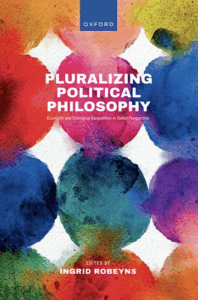One of the things that’s becoming clear is the determination of the Trump administration to divide humans living in the United States into two groups (to whom Wilhoit’s Law applies), citizens and immigrants. Actually it is a bit more complicated than that, because some of the legal citizens are, in reality, at best some sort of semi-citizen, but let’s keep things simple for now. What I want to focus on is how incompatible this is with the notion of a free society, indeed with a free society even as those on the political right have historically seen it.
The Trumpists think they have a discretionary right to deport immigrants for wrongthink and wrongspeech, for taking part in a pro-Palestine demonstration, but also for writing a newspaper article, making a social media post, sharing a social media post, even liking one. They think that such people have no right not to be snatched off the street by goon squads. And they think that when immigrants face deportation for wrongthink they should have no right to contest the decisions made about them. The US courts may yet disagree with the Trumpists about these matters, but we’ll see.
Immigrants are people. Sorry for insisting on a truism, but I say it not just to argue that they have rights as humans, but also to make a point about their behaviour. US citizens are people too. And as people do, individuals in these two groups will barter and truck, fuck, form romantic ties, break bread, get drunk together, study together, worship together, share and dispute ideals, like and dislike books, operas, tv shows. Et cetera. You can’t monitor and control the activities of the individuals in one of these groups without monitoring and controlling the activities of the people in the other group who are in millions of cases the counterparties to their transactions and attachments.
One of the marks of a free society, at least as many liberals and conservatives have insisted, is that it is composed of smaller societies through which much of its life is conducted. Associations, clubs, universities, schools, families, and so forth. Those societies have a life of their own and the wider society of which they form a part loses its own freedom and vitality when the state subordinates their inner life to its own purposes. Not that all such regulation is bad: some is necessary for justice and equality and even child protection (cf Brighouse and Swift). But overdo it and you create not a free society but a totalitarian one. Though immigrants may not be full legal and political members of the big society, they are often full and equal participants in the smaller ones and, as such, they need to be able to argue, express, consent, dissent, voice and exit just as the other members do. The smaller societies can’t function properly if they are composed of some people with rights and some people without them. Every member needs to hear what other members say and when some people can’t express themselves for fear of the consequences that not only destroys the inner life of society but also leaves individuals open to blackmail and exploitation.
As the United States slides into totalitarianism, there’s not much that anyone can say in a blog post that will prevent the worst. But if it is, at least, to stand as a warning to other societies that want to retain such freedom as they have, then we had better notice that the casual assumption that a neat quasi-natural divide can be drawn between citizens and immigrants isn’t limited to the US, it is the routine unthinking blather of politicians in Europe and elswhere, and not just on the extreme right. And if and when the bad times come and the immigrants get targeted, that will harm not just the direct objects of xenophobic policies but also all of the individuals who live lives entwined with theirs, some of whom will doubtless find their own status reclassified.


